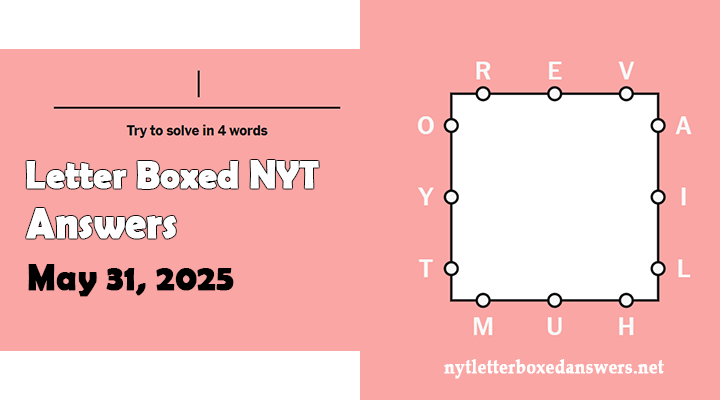NYT Letter Boxed quiz for Saturday May 31, 2025 is released. We came up with Letter Boxed May 31 2025 Answers and Hints for you. With the help of these hints, you will be able to guess the words of letter boxed quiz without revealing the answers and get the solution.
| Top | Right | Bottom | Left |
|---|---|---|---|
| REV | AIL | MUH | OYT |
| Two Words Solution | ||
|---|---|---|
| ULTRAVIOLET | THYMI | |
| AMEIVA | AUTHORLY | |
| OVARIOLE | EUTHYMY | |
| RIVULET | THYMOΜΑ | |
| Three Words Solution | ||
|---|---|---|
| ARMOUR | RIVULET | THYMY |
| HAVIOUR | RAT | TIMELY |

Word 01:
This 11-letter word starts with U and ends with T, describing electromagnetic radiation just beyond the violet spectrum.
A type of light that causes sunburn.
Commonly abbreviated as UV.
Invisible to the human eye, but impactful on skin.
Used in sterilization and forensic detection.
Found naturally in sunlight.
Bees can see it, but humans can’t.
Shorter wavelength than visible light.
Can damage DNA and cause mutations.
Often blocked by sunscreen and sunglasses.
Word 02:
This 5-letter word starts with T and ends with I, referring to plural forms of a fragrant culinary herb.
Varieties of this herb include lemon and wild types.
Often used in Mediterranean cooking.
Related to mint in botanical classification.
Dried leaves are used in herbal teas.
Has antiseptic properties and is used medicinally.
Popular in poultry and stew seasoning.
Tiny leaves with powerful aroma.
Resembles oregano in appearance and use.
Considered symbolic of courage in ancient times.
Word 01:
This 6-letter word starts with A and ends with A, naming a genus of swift-moving tropical lizards.
Known as “whiptails” in the reptile world.
Common in Central and South America.
Often seen darting across warm forest floors.
Their scales are shiny and often colorful.
Diurnal reptiles with rapid reflexes.
Feed on insects and small invertebrates.
Related to teiids and racerunners.
Some species reproduce without males.
Found sunbathing on rocks or logs.
Word 02:
This 8-letter adjective starts with A and ends with Y, meaning characteristic of an author or writer.
Resembling the tone or voice of a literary creator.
Suggestive of narrative authority or command.
Evokes a writer’s deliberate expression.
Formal and composed like professional prose.
May imply self-conscious writing style.
Possessing the gravitas of a published voice.
Descriptive of scholarly or literary flair.
Might be used in book reviews or critiques.
Having a confident, text-driven presence.
Word 01:
This 8-letter noun starts with O and ends with E, describing a tubular unit of an insect’s ovary.
Site of egg development in many insects.
Found in queen bees and other fertile females.
Studied in entomology and reproductive biology.
Determines potential egg-laying capacity.
Can be polytrophic or telotrophic in form.
Resides inside the insect abdomen.
Microscopic and part of reproductive anatomy.
Number varies by insect species.
Essential in forming oocytes and nurse cells.
Word 02:
This 8-letter noun starts with E and ends with Y, describing a state of calm, balanced mental well-being.
Absence of mood disturbances in psychiatry.
A goal in treatment of bipolar disorder.
Psychological state between mania and depression.
Synonymous with emotional stability.
Indicative of consistent mood regulation.
Often a baseline for measuring therapy success.
Associated with serenity and internal peace.
Philosophically linked to stoic calm.
Term used in clinical mood assessments.
Word 01:
This 7-letter word starts with R and ends with T, meaning a small stream or trickle of water.
A miniature version of a brook or creek.
Often forms after rainfall along hillsides.
Can be seen winding gently through soil.
Used metaphorically for tears or blood.
Found in poetic nature descriptions.
A delicate flow, almost like a thread.
May carve paths into soft earth.
Babbling or murmuring softly as it moves.
Sometimes joins larger streams or rivers.
Word 02:
This 7-letter noun starts with T and ends with A, referring to a tumor originating in the thymus gland.
Often associated with myasthenia gravis.
Found in the anterior mediastinum.
May be benign or malignant.
Diagnosed via imaging and biopsy.
Treated with surgery, chemo, or radiation.
Rare but significant in thoracic oncology.
Develops near the chest area.
Arises from epithelial cells of the thymus.
May cause symptoms like cough or chest pain.
Word 01:
This 6-letter word starts with A and ends with R, meaning a protective covering for the body, especially in battle.
Worn by knights in medieval times.
Made of metal plates or chainmail.
Used to shield against weapons.
Can also refer to military vehicles’ protection.
Symbol of defense or strength.
Modern versions include bulletproof vests.
Also used metaphorically for emotional walls.
Seen in museums of medieval history.
Sometimes highly decorative as well as functional.
Word 02:
This 7-letter word starts with R and ends with T, meaning a small stream or trickle of water.
A miniature version of a brook or creek.
Often forms after rainfall along hillsides.
Can be seen winding gently through soil.
Used metaphorically for tears or blood.
Found in poetic nature descriptions.
A delicate flow, almost like a thread.
May carve paths into soft earth.
Babbling or murmuring softly as it moves.
Sometimes joins larger streams or rivers.
Word 03:
This 6-letter word starts with T and ends with Y, describing something full of or smelling like thyme.
Fragrant with a savory herbal note.
Describes a garden rich in culinary herbs.
Evokes scents used in roasts and stews.
Related to Mediterranean spice blends.
May describe air near wild thyme patches.
Scented similarly to oregano and rosemary.
Could refer to thyme-covered fields.
Used in herbal sachets or potpourri.
Often found in descriptions of rustic kitchens.
Word 01:
This 8-letter word starts with H and ends with R, referring to the manner in which a person acts or conducts themselves.
British spelling of a common psychological term.
Observed to assess personality or mood.
Subject of studies in sociology and psychology.
Includes actions, reactions, and social conduct.
May be labeled as good, bad, or disruptive.
Influenced by upbringing, culture, and environment.
Can be conditioned or reinforced.
Often discussed in education and therapy.
A reflection of thoughts, values, or emotions.
Word 02:
This 3-letter word starts with R and ends with T, referring to a rodent known for scavenging and sharp teeth.
Found in sewers, subways, and attics.
Sometimes kept as intelligent pets.
Often used in scientific experiments.
Has a long tail and sharp front incisors.
Carries a cultural image of betrayal.
Central figure in pest control stories.
Featured in urban legends and folklore.
Can squeeze through tight spaces.
A slang term for an informant.
Word 03:
This 6-letter adjective starts with T and ends with Y, meaning happening at a suitable or opportune moment.
Done just when needed.
Appropriate in timing.
Often used to describe interventions or responses.
Related to punctuality and efficiency.
Can prevent further complications.
Describes news that is currently relevant.
The opposite of late or delayed.
Related to deadlines and schedules.
May describe a well-placed comment.

Chris Brown is a passionate word game love and problem solving expert. With over 15 years of experience in solving puzzle challenges, he provides daily NYT Letter Boxed answers, tips and strategies to help other players so that they can improve their solving skills. Whether you are stuck on a tricky puzzle or looking for new techniques, Chris is here to guide you with his expert solutions.